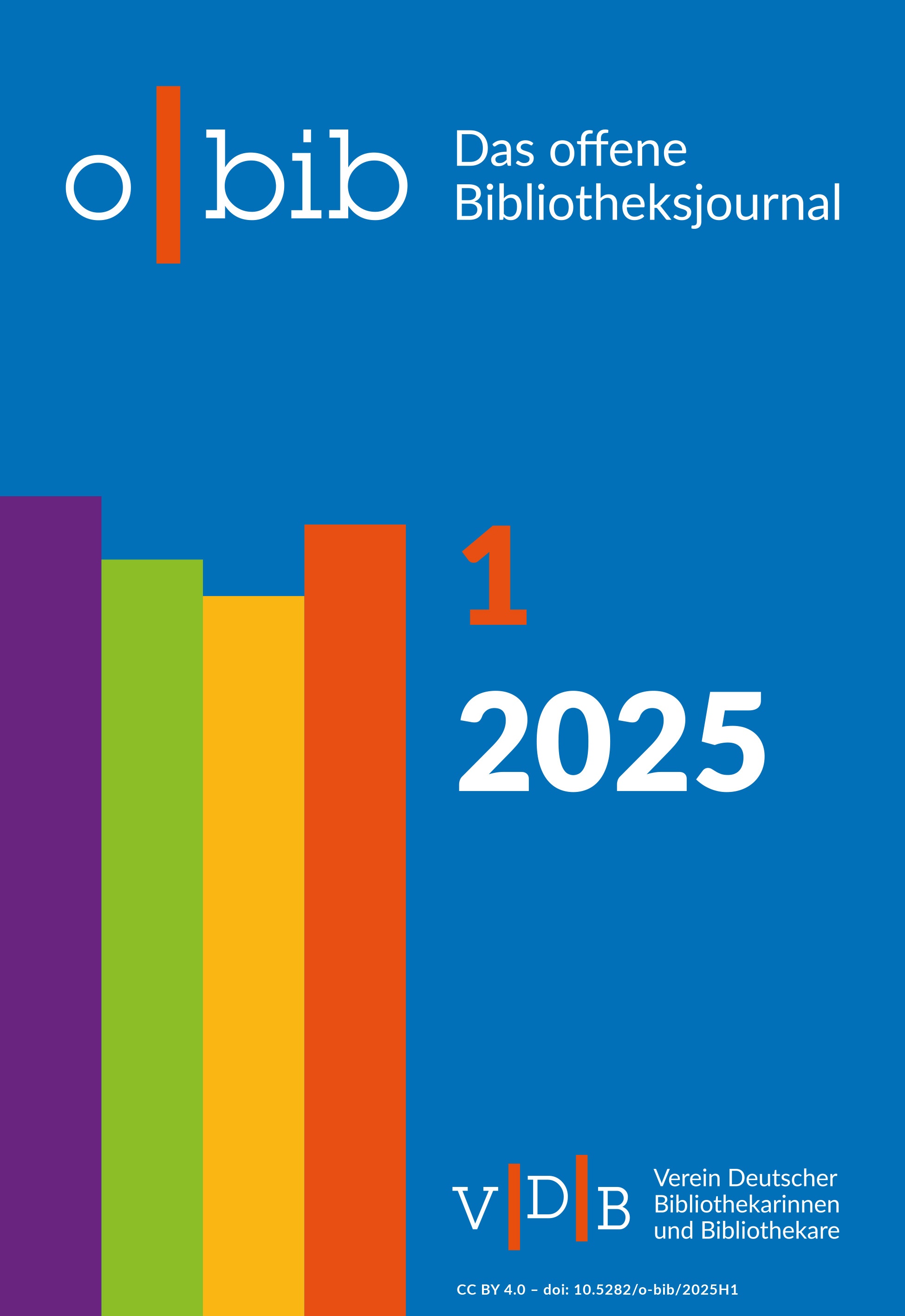Informationsbudgets an wissenschaftlichen Einrichtungen
Ergebnisse einer Befragungsstudie
DOI:
https://doi.org/10.5282/o-bib/6114Keywords:
Information budget, Transparency, Publication monitoring, Qualitative interviewsAbstract
Academic institutions are advised by the German Council of Science and Humanities and the Federal Ministry of Education and Research to obtain a complete overview of their financial flows to publishers. This comprehensive view is to be realized by means of monitoring procedures, thus laying the basis for the development of an information budget. This study investigates the implementation of an information budget at academic institutions, in particular at university libraries. For this purpose, guideline-based interviews were conducted. The results show that the introduction of an information budget is perceived by the participants as a significant topic and is considered sensible in its basic idea. Due to the heterogeneity of local conditions in the institutions surveyed, the implementation of the information budget is very diverse. It turned out that there are similarities between libraries in terms of requirements and challenges with the information budget, but also different approaches and library-specific needs. This paper reflects the experiences and assessments of the participants and makes it clear that the funding requirements and local structures are decisive for the form of the information budget.
References
Bartlewski, Julia; Broschinski, Christoph: Metadatenschema für die Erfassung und Übertragung von Kostendaten, in: o-bib. Das offene Bibliotheksjournal, Bd. 10 Nr. 4, 2023, https://doi.org/10.5282/o-bib/5971.
Bauer, Bruno; Capellaro, Christof; Ferus, Andreas u.a.: Austrian Transition to Open Access (AT2OA), in: Bibliothek Forschung und Praxis 42 (3), 2018, S. 463–475, https://doi.org/10.1515/bfp-2018-0062.
Bergenthum, Hartmut: Open-Access-Publikationsfonds der Universitätsbibliothek Marburg, in: o-bib. Das offene Bibliotheksjournal, Bd. 11 Nr. 1, 2024, https://doi.org/10.5282/o-bib/6017.
BMBF: Open Access in Deutschland Die Strategie des Bundesministeriums für Bildung und Forschung, 2018, https://www.bmbf.de/SharedDocs/Publikationen/de/bmbf/1/24102_Open_Access_in_Deutschland.html, Stand: 11.06.2024.
BMBF: Open Access - Die Publikationsform für die Zukunft, 2021, https://www.bildung-forschung.digital/digitalezukunft/de/wissen/open-access/open-access-die-publikationsform-fuer-die-zukunft/die-publikationsform-fuer-die-zukunft_node.html, Stand: 17.06.2024.
Alexander Bogner, Alexander; Littig, Beate; Menz, Wolfgang: Interviews mit Experten. Eine praxisorientierte Einführung, Wiesbaden 2014, https://doi.org/10.1007/978-3-531-19416-5.
Deutsche Forschungsgemeinschaft: Merkblatt und ergänzender Leitfaden Open-Access-Publikationskosten, 2021, https://www.dfg.de/resource/blob/167598/b5586c046f53b507efbb36f26a1c1429/12-21-de-data.pdf, Stand: 11.06.2024.
Deutsche Forschungsgemeinschaft: Förderprogramm: „Open-Access-Publikationskosten“, 2022, https://www.dfg.de/de/foerderung/foerdermoeglichkeiten/programme/infrastruktur/lis/lis-foerderangebote/open-access-publikationskosten, Stand: 11.06.2024.
Ferguson, Lea Maria; Meistring, Marcel; Bertelmann, Roland u.a.: Report zur Veranstaltung: Transform2Open-Workshop „Erste Schritte für ein Referenzmodell für das Informationsbudget“, 2024, https://doi.org/10.5281/zenodo.10628693.
Ferguson, Lea Maria; Orth, Astrid; Ott, Luise u.a.: Folienvorlage zur Unterstützung von wissenschaftlichen Einrichtungen bei der Einführung eines Informationsbudgets, 2024, https://doi.org/10.5281/zenodo.11549877.
Fokusgruppe Informationsbudget: Definition Informationsbudget, 2024, https://doi.org/10.5281/zenodo.11439996.
German Science and Humanities Council: Empfehlungen zur Transformation des wissenschaftlichen Publizierens zu Open Access, 2022, https://doi.org/10.57674/fyrc-vb61.
Gläser, Jochen; Laudel, Grit: Experteninterviews und qualitative Inhaltsanalyse. Lehrbuch, Wiesbaden 2010.
Helfferich, Cornelia: Leitfaden- und Experteninterviews, in: Baur, Nina; Blasius, Jörg (Hg.): Handbuch Methoden der empirischen Sozialforschung, Wiesbaden 2019, S. 669–686, https://doi.org/10.1007/978-3-658-21308-4_44.
Mittermaier, Bernhard: Informationsbudget, in: o-bib. Das offene Bibliotheksjournal 9 (4), 2022, https://doi.org/10.5282/o-bib/5864.
Ottaviani, Jim: The Post-Embargo Open Access Citation Advantage: It Exists (Probably), Its Modest (Usually), and the Rich Get Richer (of Course), in: PloS one 11 (8), 2016, https://doi.org/10.1371/journal.pone.0159614.
Pampel, Heinz: Auf dem Weg zum Informationsbudget. Zur Notwendigkeit von Monitoringverfahren für wissenschaftliche Publikationen und deren Kosten. Arbeitspapier, 2019, https://doi.org/10.2312/os.helmholtz.006.
Rosenbaum, Konstanze: Von Fach zu Fach verschieden. Diversität im wissenschaftlichen Publikationssystem, in: Weingart, Peter; Taubert, Niels (Hg.): Wissenschaftliches Publizieren, Berlin, Boston 2016, https://doi.org/10.1515/9783110448115-002.
Rossmann, Doralyn; Arlitsch, Kenning: From Acquisitions to Access: The Changing Nature of Library Budgeting, in: Journal of Library Administration 55 (5), 2015, S. 394–40, https://doi.org/10.1080/01930826.2015.1047279.
Schön, Margit; Barbers, Irene; Mittermaier, Bernhard: Publikationskostenmonitoring: Aktueller Stand und Herausforderungen des Monitorings von Publikationskosten an deutschen wissenschaftlichen Einrichtungen, 2024, https://doi.org/10.5281/zenodo.10810729.
Schweighofer, Bianca; Bartlewski, Julia: Building an Infrastructure for Cost Data Transparency, in: Katina Magazine, 2024, https://doi.org/10.1146/katina-121824-1.
Wijk, Ingrid M.: 4c. Open access in the Netherlands, in: Söllner, Konstanze; Mittermaier, Bernhard (Hg.): Praxishandbuch Open Access, 2017, S. 223–237, https://doi.org/10.1515/9783110494068-026.
Downloads
Published
Issue
Section
License
Copyright (c) 2025 Franziska Woitschach

This work is licensed under a Creative Commons Attribution 4.0 International License.





